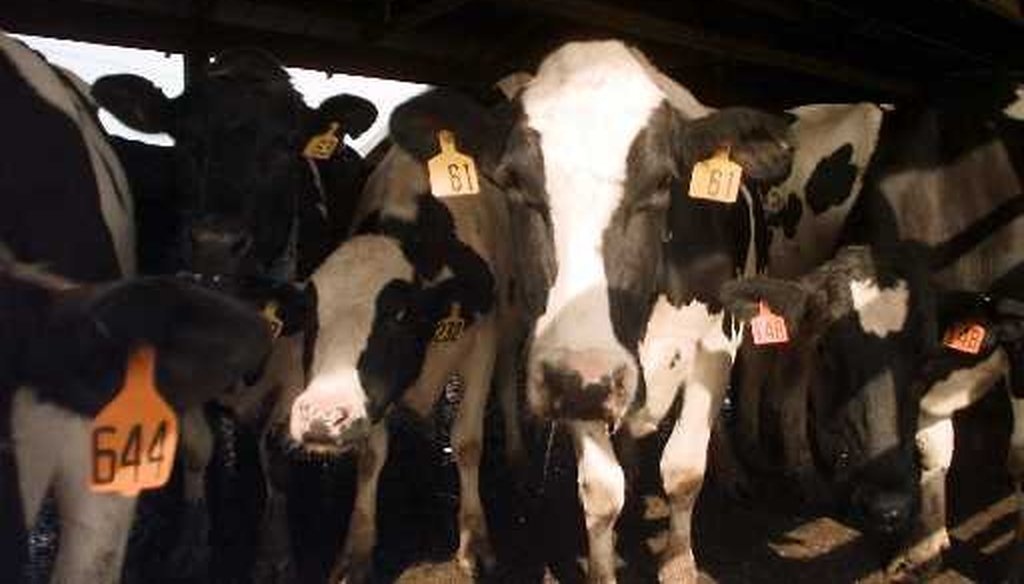



Rep. H. Morgan Griffith is having a cow about EPA milk regulations.
U.S. Rep. H. Morgan Griffith is milking his opposition to the Environmental Protection Agency for every last drop.
The Republican stressed his contempt for the agency throughout a heated campaign last fall in which Griffith unseated Democrat Rick Boucher, a 14-term congressman from coal-rich Southwest Virginia. In his victory speech, Griffith vowed to go to Washington and "fight to rein in the EPA." Since taking office, he has fired out a barrage of anti-EPA statements.
In a February newsletter to constituents, Griffith claimed that new EPA rules treat milk spills the same way they treat oil spills. He titled the newsletter "Crying over spilt milk."
"What do spilt milk and oil have in common?" he wrote. "Quite a bit, according to the EPA. In fact, a new ruling by the EPA would force dairy farmers to comply with the Spill Prevention, Control and Countermeasure Program when dealing with spilt milk -- the same regulations oil and natural gas producers must follow. The EPA’s reasoning is that milk contains ‘a percentage of animal fats, which is a non-petroleum oil.’ It appears spilt milk is just as threatening as an oil spill."
With visions of dairy farmers delicately dabbing milk off the wings of ducks, we looked into the claim.
Beth Breeding, Griffith’s press secretary, said her boss’s information came from the EPA’s website. So we went there.
Right away, we found problems with Griffith’s claim. The website says milk has been regulated under the Spill Prevention Control and Countermeasure program since 1973, when the Clean Water Act took effect. The law was passed by Congress the preceding year over the veto of Republican President Richard Nixon. So this is hardly a "new ruling," as Griffith says. It has been in effect for 38 years.
The EPA site says "since the SPCC rule became law in 1973, all kinds of oils including petroleum and edible oils (such as animal fats and vegetable oils) have been considered oils. This is because the SPCC rule gets its definition of ‘oil’ from the Clean Water Act, which was authored by Congress."
The website also notes the rule only applies to farms storing more than 1,320 gallons of oil or milk.
So what’s new? According to the EPA, the only thing that comes close is a rule change it announced on Jan. 15, 2009. It goes in effect at the end of this month.
The simple purpose of the change is to exclude milk and dairy farms from the spill rules governing oil products. That’s the exact opposite of what Griffith claims. Here’s what the regulation says:
"EPA proposes to exempt milk containers and associated piping and appurtenances from the SPCC requirements provided they are constructed according to the current applicable 3-A Sanitary Standards, and are subject to the current applicable Grade "A" Pasteurized Milk Ordinance," or similar state laws.
Translated into plain English, the rule means milk storage will no longer have to meet the EPA’s oil spill rules, provided storage tanks meet pasteurization laws. In Virginia it is illegal to sell "raw," or unpasteurized, milk, so the state’s dairy farmers should already be in compliance with the new standards.
Raw milk is now legal for sale in 25 states, although 15 of those states only allow sales directly from a farm. So conceivably raw milk producers -- which are almost exclusively small operations, according to a group that advocates for raw milk -- might still need to comply with the SPCC rules. But this would affect only a very small fraction of total U.S. milk.
Baffled by how Griffith could have this claim so mixed up, we went back to his office for additional information. The second time around his press secretary pointed us to a Jan. 27 editorial in The Wall Street Journal that makes virtually the same claim. The editorial wrongly said new EPA rules will apply to dairy farms and cover milk storage. The amended rule only applies to petroleum products -- gasoline, fuel oil and the like -- that are stored in large quantities on dairy farms.
Let’s review our findings.
Griffith claimed a "new ruling by the EPA would force dairy farmers to comply" with strict regulations for spills and leaks. He said the rules were the same as those enforced on oil and natural gas companies.
In fact, these regulations have been in place for 38 years and are not new at all. The "new ruling" from the EPA, announced in 2009 and taking effect in a few weeks, actually excludes milk from the spill standards, giving dairy farmers fewer regulations to meet. That’s the exact opposite of what Griffith claims.
Sure, Griffith got some of his information from an inaccurate editorial in The Wall Street Journal. But a congressman who is railing against a federal agency has the means to get his facts right.
Griffith is dishing udder cow chips. We rate his statement False.
Rep. H. Morgan Griffith, Congressman Griffith’s e-newsletter, Feb. 11, 2011.
Environmental Protection Agency, Spill Prevention, Control and Countermeasure rule and milk, accessed March 8, 2011.
Environmental Protection Agency, Oil Pollution Prevention; Spill Prevention, Control, and Countermeasure Rule Requirements--Amendments, accessed March 8, 2011.
Code of Virginia, Uniform regulation of milk, accessed March 9, 2011.
Morgan Griffith for Congress, Griffith, GOP take back Ninth, Nov. 3, 2010.
Richmond Times-Dispatch, Boucher, Griffith debate impact of cap and trade, Oct. 21, 2010.
The Wall Street Journal, Land of milk and regulation, Jan. 27, 2011.
E-mail interview with Beth Breeding, press secretary for Rep. H. Morgan Griffith, March 7, 2011.
Interview with Richard Yost, spokesman, Environmental Protection Agency, March 8, 2011.
In a world of wild talk and fake news, help us stand up for the facts.
